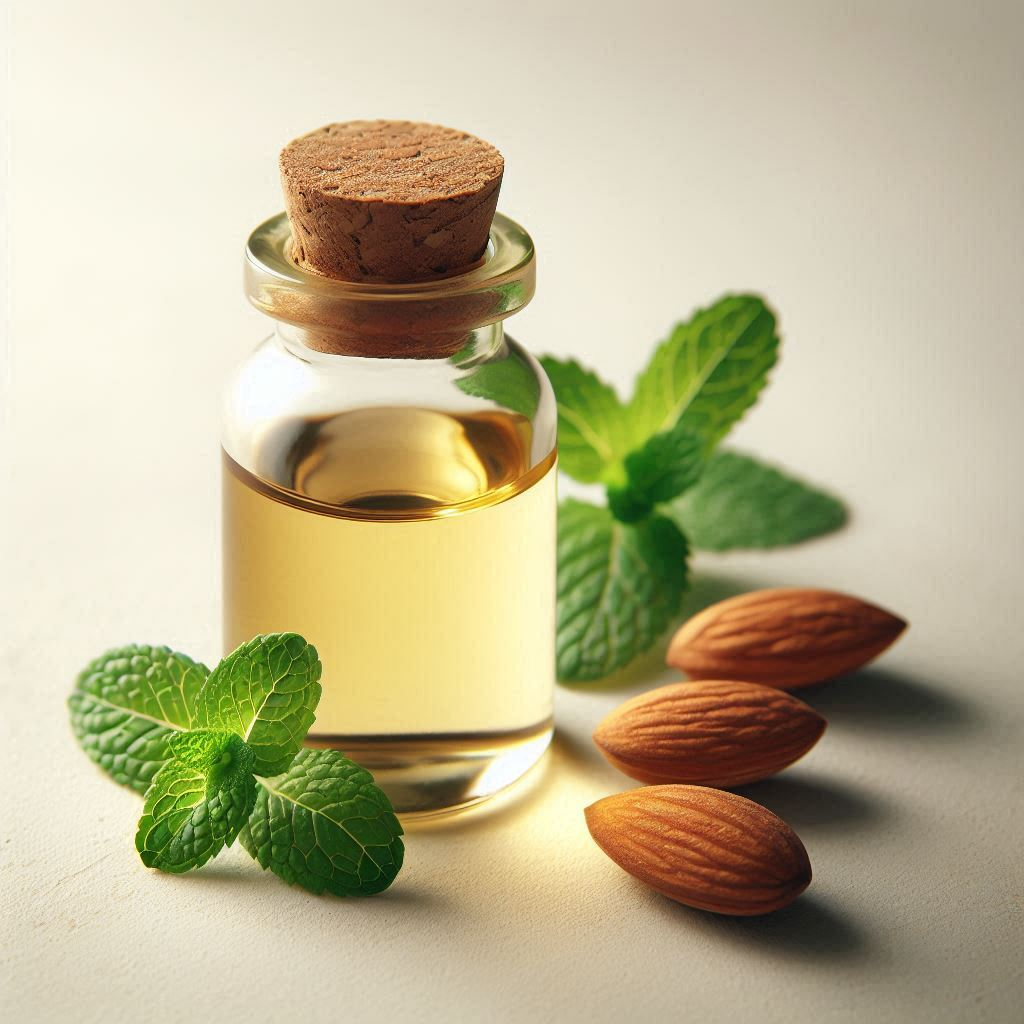What is almond oil?

Almond oil is a natural oil extracted from almonds, specifically from the kernels of sweet almonds (Prunus dulcis). It is known for its various cosmetic, culinary, and medicinal uses.
It is rich in nutrients such as vitamin E, omega-3 fatty acids, and antioxidants, making it beneficial for skin and hair care.
Origin and extraction
Almond-oil is extracted from almonds, specifically the seeds or kernels of the almond tree (Prunus dulcis). Here’s a bit more detail on its origin and extraction process:
Origin: Almond trees are native to the Middle East and South Asia, particularly Iran and surrounding regions. They have been cultivated for thousands of years for their nuts, which contain the seeds used to produce almond oil.
Extraction: There are two primary methods used to extract almond-oil:
- Cold-pressing (Mechanical Extraction): This method involves crushing the almonds in a press to extract the oil. The process doesn’t involve any heat or chemicals, which helps preserve the natural nutrients and properties of the oil. Cold-pressed almond oil is typically used for culinary purposes and in skincare products.
- Solvent Extraction: In this method, a solvent (often hexane) is used to extract the oil from the almonds. After extraction, the solvent is removed through evaporation, leaving behind almond oil. This method is more efficient in extracting oil from the almonds but may involve traces of the solvent unless properly removed.
Types
There are primarily two types of almond-oil based on the variety of almonds used and the extraction process:
- Sweet Almond Oil:
- Origin: Sweet almond-oil is extracted from the seeds of the Prunus dulcis tree, specifically from the variety known as sweet almonds.
- Properties: It has a mild, nutty aroma and a pale yellow color. Sweet almond-oil is rich in vitamin E, omega-3 fatty acids, and other nutrients. It is widely used in skincare as a moisturizer, massage oil, and carrier oil for essential oils. It’s also used in cooking and baking due to its mild flavor.
- Bitter Almond Oil:
- Origin: Bitter almond-oil comes from bitter almonds, which are also from the Prunus dulcis species but are a different variety than sweet almonds.
- Properties: Bitter almond-oil has a stronger aroma and flavor compared to sweet almond oil. It contains amygdalin, a compound that breaks down into toxic substances like cyanide. Due to this toxicity, bitter almond oil is not used in culinary applications and is primarily used in small amounts in certain cosmetic and pharmaceutical products for its aromatic properties.
Nutritional composition
Almond-oil is renowned for its rich nutritional composition, which includes a variety of beneficial components:
- Fatty Acids:
- Almond-oil is predominantly composed of monounsaturated fatty acids (MUFA), primarily oleic acid (approximately 70-80% of total fatty acids). Oleic acid is known for its cardiovascular benefits and is also found in olive oil.
- It also contains smaller amounts of polyunsaturated fatty acids (PUFA), such as linoleic acid (an omega-6 fatty acid) and alpha-linolenic acid (an omega-3 fatty acid).
- Vitamins:
- Almond-oil is particularly rich in vitamin E, primarily in the form of alpha-tocopherol. Vitamin E is a potent antioxidant that helps protect cells from oxidative stress and supports skin health.
- Phytosterols:
- Phytosterols are plant-derived compounds with a structure similar to cholesterol. Almond-oil contains phytosterols, which can help reduce cholesterol levels and support heart health.
- Other Nutrients:
- Almond-oil also contains trace amounts of other nutrients such as vitamin K and minerals like magnesium, calcium, and potassium.
- Caloric Content:
- Like all oils, almond-oil is calorie-dense, providing around 120 calories per tablespoon (15 ml). This makes it an energy-rich addition to the diet.
Benefits
Almond-oil offers a wide range of benefits, both for health and beauty. Here are some of the important benefits of almond oil:

- Skin Moisturization:
- Rich in fatty acids and vitamin E, almond-oil nourishes and moisturizes the skin. It’s suitable for all skin types, including sensitive skin, and helps in maintaining skin hydration and improving complexion.
- Anti-inflammatory Properties:
- The presence of fatty acids like oleic acid and linoleic acid in almond-oil helps reduce inflammation. It can soothe irritated skin and may be beneficial for conditions like eczema and dermatitis.
- Improves Skin Tone and Complexion:
- Regular use of almond-oil can help even out skin tone and improve complexion. Its emollient properties make it effective in reducing dark circles under the eyes and lightening skin discoloration.
- Reduces Signs of Aging:
- Vitamin E in almond-oil is a powerful antioxidant that helps protect skin cells from damage caused by free radicals. Regular application can help reduce wrinkles, fine lines, and other signs of aging.
- Promotes Hair Health:
- Almond-oil is used widely in hair care products due to its ability to moisturize and nourish hair strands. It can strengthen hair, reduce hair breakage, and add shine. Massaging almond oil into the scalp also helps improve blood circulation, promoting healthier hair growth.
- Supports Heart Health:
- The high content of monounsaturated fats in almond-oil, particularly oleic acid, helps lower LDL (bad) cholesterol levels and reduce the risk of cardiovascular diseases when consumed in moderation as part of a balanced diet.
- Aids in Digestion:
- Almond-oil has been traditionally used to relieve constipation and improve digestion. It may act as a mild laxative when consumed orally.
- Natural Makeup Remover:
- Almond-oil can effectively remove makeup without drying out the skin. It’s gentle on the delicate skin around the eyes and can also be used to cleanse the face.
- Carrier Oil for Essential Oils:
- Due to its mild scent and lightweight texture, almond-oil is an excellent carrier oil for diluting essential oils for aromatherapy and massage purposes.
- Nutrient-Rich Culinary Oil:
- Almond-oil can be used in cooking and baking as a healthy alternative to other oils. It adds a subtle nutty flavor to dishes and provides beneficial nutrients like vitamin E and unsaturated fats.
Skin benefits
Almond oil is highly beneficial for the skin due to its rich content of vitamins, fatty acids, and antioxidants. Here’s how almond oil can be used effectively for skin care:

- Moisturization:
- Almond-oil is an excellent emollient, meaning it helps to lock moisture into the skin. It’s light and easily absorbed, making it suitable for all skin types, including sensitive and oily skin. Regular application of almond-oil keeps the skin soft, smooth, and hydrated.
- Improving Skin Tone:
- Almond-oil can enhance complexion and help balance your skin tone. It contains vitamin E, which helps in lightening dark spots and reducing hyperpigmentation. Over time, it can give the skin a more radiant and even appearance.
- Reducing Under-Eye Circles:
- The anti-inflammatory and emollient properties of almond-oil make it effective in reducing puffiness and dark circles under the eyes. Gently massaging a few drops of almond-oil around the eyes before bedtime can help diminish these signs of fatigue and stress.
- Anti-Aging Properties:
- Almond-oil is rich in antioxidants like vitamin E, which help combat free radicals that contribute to signs of aging such as wrinkles and fine lines. Regular use can help firm and tighten the skin, resulting in a more youthful appearance.
- Soothing Irritated Skin:
- The anti-inflammatory properties of almond-oil make it soothing for irritated or inflamed skin conditions such as eczema and dermatitis. It can help reduce itching, redness, and swelling when applied topically.
- Cleansing and Removing Makeup:
- Almond-oil works well as a mild, all-natural makeup remover. It effectively dissolves makeup without clogging pores or drying out the skin. After removing makeup, rinsing with warm water and patting dry leaves the skin clean and nourished.
- Preventing Stretch Marks:
- Pregnant women often use almond-oil to prevent and reduce the appearance of stretch marks. Its moisturizing and emollient properties help keep the skin elastic and supple, reducing the likelihood of stretch marks forming during pregnancy or weight fluctuations.
- Massaging Oil:
- Almond-oil is commonly used as a massage oil due to its smooth texture and mild, pleasant aroma. Massaging with almond oil improves blood circulation, relaxes muscles, and promotes overall skin health.
How to Use Almond Oil for Skin:
- Facial Moisturizer: Apply a few drops of almond-oil to clean, damp skin as a moisturizer. Apply light circular motions of massaging until completely absorbed.
- Under-Eye Treatment: Dab a drop of almond-oil around the eyes before bedtime and gently massage until absorbed.
- Makeup Remover: Apply almond-oil to a cotton pad and gently wipe off makeup from the face and eyes.
- Body Oil: Use almond-oil as a full-body moisturizer after a shower or bath to lock in moisture and keep skin soft.
- Face Mask Ingredient: Mix almond-oil with other natural ingredients like honey or yogurt to create a hydrating and nourishing face mask.
Hair benefits
Almond-oil is a versatile and beneficial oil for hair care, known for its nourishing properties. Here’s how almond-oil can be used effectively for hair:

- Moisturizes and Conditions Hair:
- Almond-oil is rich in fatty acids and vitamins (particularly vitamin E), which deeply moisturize and nourish the hair strands. It helps to seal moisture into the hair, leaving it softer, smoother, and more manageable.
- Stimulates Hair Growth:
- Massaging almond oil into the scalp improves blood circulation, which can stimulate hair follicles and promote hair growth. Over time, this may lead to stronger, thicker hair.
- Reduces Hair Breakage and Split Ends:
- The moisturizing and strengthening properties of almond oil help to reduce hair breakage and split ends. Regular use can improve the overall health and resilience of hair strands.
- Adds Shine and Luster:
- Almond oil forms a protective barrier on the hair shaft, smoothing the cuticles and enhancing the hair’s natural shine and luster. It can revive dull and damaged hair, making it look healthier and more vibrant.
- Treats Scalp Issues:
- Almond oil has anti-inflammatory properties that can help soothe scalp conditions like dandruff, itching, and inflammation. It moisturizes the scalp without clogging pores, promoting a healthy scalp environment.
- Protects Hair from Environmental Damage:
- Almond oil acts as a natural barrier against environmental pollutants and UV rays, which can damage hair and contribute to dryness and brittleness.
- Prevents Hair Loss:
- While almond oil alone may not directly prevent hair loss, its nourishing properties can help maintain overall hair health, reducing the likelihood of hair fall due to dryness or damage.
How to Use Almond Oil for Hair:
- Scalp Massage: Warm almond oil slightly and massage it into the scalp using your fingertips. After leaving it on for at least half an hour or overnight, shampoo as normal. This promotes blood circulation and nourishes the scalp.
- Hair Mask: Mix almond oil with other beneficial ingredients like honey, yogurt, or coconut oil to create a DIY hair mask. Concentrating on the ends and any damaged sections of the hair, apply the mixture to moist hair. After leaving it on for 30 to 60 minutes, shampoo and condition as normal.
- Leave-in Conditioner: After washing and towel-drying your hair, apply a small amount of almond oil to the ends and lengths of your hair as a leave-in conditioner. This helps to smooth frizz, add shine, and protect against heat styling.
- Split End Treatment: Apply a few drops of almond oil to the ends of dry or damp hair to help seal split ends and prevent further damage.
- Hair Oil Blend: Mix almond oil with other beneficial oils like argan oil or jojoba oil for a customized hair oil blend that addresses specific hair concerns.
Tip: Always perform a patch test before using almond oil (or any new product) to ensure you don’t have an allergic reaction or sensitivity.
Disadvantages
While almond oil offers numerous benefits for skin, hair, and overall health, there are a few potential disadvantages or considerations to keep in mind:

- Allergic Reactions:
- Almond oil is derived from almonds, which are nuts. Individuals with nut allergies should avoid using almond oil or perform a patch test first to ensure they do not experience an allergic reaction. Even though almond oil is typically processed to remove allergens, traces may still remain.
- Comedogenic Potential:
- Almond oil has a comedogenic rating of 2 on a scale from 0 to 5, meaning it has a moderate likelihood of clogging pores. While it’s generally non-comedogenic for most people, those with very oily or acne-prone skin may find that almond oil exacerbates breakouts. It’s advisable to use it sparingly or choose a lighter oil if you have acne-prone skin.
- Potential Rancidity:
- Like all natural oils, almond oil can become rancid over time, especially if not stored properly. Air, heat, and light exposure can quicken this process. To extend its shelf life, store almond oil in a cool, dark place and use it within its recommended expiration date.
- Sensitivity to Sunlight:
- Vitamin E in almond oil can make the skin more sensitive to sunlight. It’s advisable to apply almond oil in the evening or use sunscreen if using it during the day to avoid sunburn or skin sensitivity.
- High Caloric Content:
- Almond oil is calorie-dense, providing approximately 120 calories per tablespoon (15 ml). While it offers health benefits, excessive consumption can contribute to weight gain if not accounted for in your overall diet.
- Cost Considerations:
- High-quality almond oil can be more expensive compared to other oils, depending on the brand and extraction method. It’s important to balance its benefits with your budget and usage requirements.
- Not Suitable for Cooking at High Temperatures:
- While almond oil is suitable for light cooking and baking due to its mild flavor and nutrient profile, it has a lower smoke point compared to oils like olive oil or coconut oil. Heating almond oil to high temperatures can degrade its nutrients and lead to a bitter taste.

FAQ (frequently asked questions)
1. Is almond oil good for skin?
- Yes, almond oil is excellent for skin care. It moisturizes, nourishes, and improves skin tone. It’s rich in vitamin E and fatty acids, making it beneficial for dry, sensitive, or aging skin.
2. Can almond oil be used on face overnight?
- Yes, almond oil can be used on the face overnight as a moisturizer or treatment. It helps hydrate the skin and can reduce dark circles and puffiness around the eyes.
3. Is almond oil good for hair growth?
- Almond oil can stimulate hair growth by improving blood circulation to the scalp and providing essential nutrients to hair follicles. Regular use can strengthen hair and reduce breakage.
4. Can almond oil reduce dark circles?
- Yes, almond oil’s anti-inflammatory and moisturizing properties can help reduce dark circles and puffiness around the eyes. Gently massage a few drops of almond oil around the eye area before bedtime.
5. Is almond oil safe for sensitive skin?
- Yes, almond oil is generally safe for sensitive skin, but it’s essential to perform a patch test first to check for any allergic reactions. Choose cold-pressed, organic almond oil for the best results.
6. Is it possible to utilize almond oil as an essential oil carrier?
- Almond oil does indeed make a great carrier oil for dilution of essential oils prior to skin application. It’s lightweight, absorbs well, and has a mild scent.
7. Does almond oil clog pores?
- Almond oil has a comedogenic rating of 2, which means it has a moderate likelihood of clogging pores. While it’s generally non-comedogenic, individuals with very oily or acne-prone skin should use it sparingly.
8. How should almond oil be stored?
- Almond oil needs to be kept out of direct sunlight and heat in a cool, dark location. Refrigeration can extend its shelf life. Make sure the bottle seals properly to avoid oxidation.
9. Can almond oil be used for cooking?
- Yes, almond oil can be used in light cooking and baking. It has a mild, nutty flavor and is rich in healthy fats and vitamin E. However, it has a lower smoke point compared to other oils, so it’s best used for low to medium heat cooking.
10. Is almond oil safe during pregnancy?
- Almond oil is generally considered safe for external use during pregnancy. It can help prevent and reduce stretch marks due to its moisturizing properties. However, consult with your healthcare provider before using it, especially if you have any concerns.
Conclusion
Almond oil stands as a testament to nature’s bounty, offering a myriad of benefits for both external and internal health. Whether used for skincare, haircare, or culinary purposes, its rich nutritional profile and gentle nature make it a cherished companion in personal care rituals worldwide.
Table of Contents
Read more about Almond oil
Go and visit dusearchit.in and get more knowledge about others topics.
